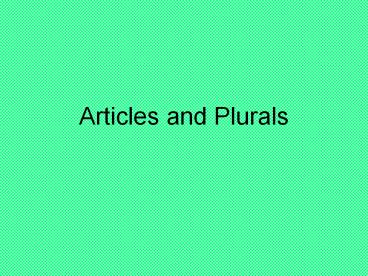Articles and Plurals PowerPoint PPT Presentation
1 / 13
Title: Articles and Plurals
1
Articles and Plurals
2
- Whats an article? Consider the following
- el libro la silla
- el cuaderno la puerta
- el bolígrafo la mesa
- What do you think el means? How about la?
- If you said the, youre right. Both el and
la mean the. - But how do you know if you should use el or
la if you want to say the?
3
- Look again
- el libro la silla
- el cuaderno la puerta
- el bolígrafo la mesa
- Do all the words with el have something in
common? - Do all the words with la have something in
common? - Most words that end in o get el.
- Most words that end in a get la.
4
- We call nouns that get el masculine.
- We call nouns that get la feminine.
- Theres no good reason we call a book (el
libro) masculine and a chair (la silla) feminine.
The reason we do so is that words that really
are feminine, like girl (la chica), daughter (la
hija), and niece (la sobrina), get la, so we
call all words that get la feminine words.
Likewise, words that really are masculine, like
boy (el chico), son (el hijo), and nephew (el
sobrino), get el, so we call all words that get
el masculine words.
5
- So . . .
- el libro el cuaderno el bolígrafo
- are masculine and
- la silla la puerta la mesa
- are feminine.
- But what about . . .
6
- . . . words that dont end in o or a?
- la clase el papel
- la flor el lápiz
- la nieve el reloj
- How do you know if the word is masculine or
feminine? - Thats easy you memorize it. If you learn a
noun that doesnt end in o or a, youll have to
memorize if el or la goes with it so youll
know if its masculine or feminine. - Likewise, if you come across a word thats an
exception, like - el mapa
- el día
- la mano
- you have to memorize it.
7
- Look at our samples of masculine and feminine
nouns again - el libro la silla
- el cuaderno la puerta
- el bolígrafo la mesa
- Bad news you cant use el and la if you make
the noun plural. In Spanish (and many other
languages), if you make the noun plural, you also
have to make the article plural - los libros las sillas
- los cuadernos las puertas
- los bolígrafos las mesas
- So there are 4 ways to say the in Spanish
- masculine feminine
- singular el la
- plural los las
8
- Click here to go to a brief practice exercise.
9
- El, la, los, las in Spanish and the in English
are called definite articles. If I say, I want
the car, you know I have a definite car in mind.
If I say, I want a car, I dont have a
definite car in mind. So we have indefinite
articles too. - un libro una silla
- unos libros unas sillas
- Un libro means a book, and una silla means
a chair. (If we used the word for apple, we
would have an apple, but in Spanish, theres no
difference between a and an.) - el libro the book los libros the books
- un libro a book unos libros ? books
- We cant say a books. So the translation for
unos and unas is some.
10
Click here to go to a brief practice exercise.
11
Plurals
- Making words plural in Spanish is much easier
than making them plural in English - libro libros
- silla sillas
- hombre hombres
- papel papeles
- flor flores
- reloj relojes
- Can you figure out the rule?
- If the word ends in a vowel, you add s if the
word ends in a consonant, you add es.
12
- No child-children, mouse-mice, goose-geese, etc.
There are only two exceptions to the rule. One
is words that have 8 letters or more and already
end in s - el cumpleaños los cumpleaños
- Rememberonly words that have 8 letters or more.
The word país doesnt have eight letters, so it
gets es like all other words that end with a
consonant países. - The other exception is days of the week that end
in s - el lunes los lunes
- el martes los martes
- etc., but
- el sábado los sábados
- el domingo los domingos
13
- Click here to go to a brief practice exercise.
- Then click here to go to your homework.

